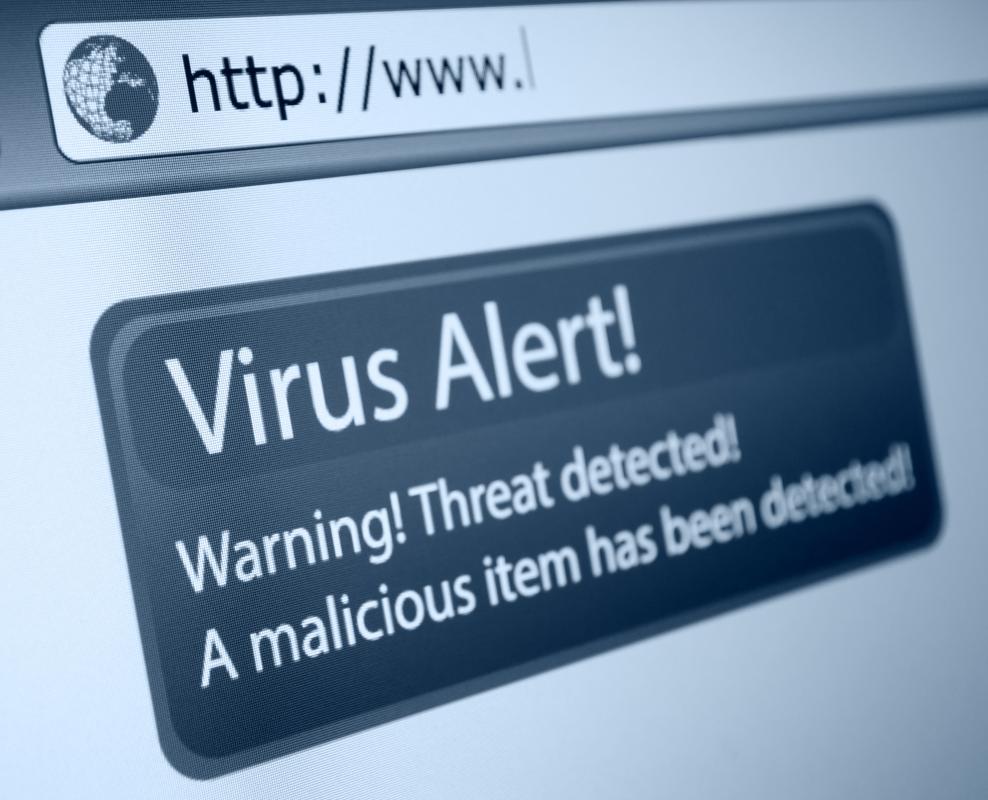At EasyTechJunkie, we're committed to delivering accurate, trustworthy information. Our expert-authored content is rigorously fact-checked and sourced from credible authorities. Discover how we uphold the highest standards in providing you with reliable knowledge.
What are the Best Tips for Spyware and Virus Removal?
There are a number of different tips and suggestions for spyware and virus removal from a computer. Maintaining an up-to-date antivirus program is one of the most important tips for both preventing and removing spyware and viruses. Once a computer is infected, it can often be necessary to remove spyware or a virus from a computer by booting the system in safe mode or from disk. While perhaps not applicable for spyware and virus removal from a computer, one of the best tips for computer users is to practice careful computer-using habits to try to avoid most malicious software in the first place.
Spyware and virus removal can be one of the most difficult and unpleasant actions a computer user will ever have to take. Once a piece of malicious software has installed itself onto a computer, removal of that software can be quite difficult and may take a great deal of effort. A computer should have an excellent antivirus program installed onto it, and this program should be kept up to date. New viruses and spyware are discovered with alarming frequency; to ensure proper spyware and virus removal from a system, the antivirus program on that system must be able to identify new malicious software on a computer.

Malicious software often manages to not only change how a computer operates, but to also hide itself within a computer system and make spyware and virus removal more difficult. This can be done in a number of different ways, though one of the most common is for a virus program to hide an installation operation for itself within the boot priorities of an operating system (OS). Once this is done, if the virus is removed from a computer, the virus will then be reinstalled when the computer is restarted and the OS boots up again. To work around this problem, and ensure proper spyware and virus removal, a computer can be started in safe mode or from an OS disk that bypasses the install instruction the virus created, and then an antivirus program can be run.

As long as any important data on a hard drive is properly backed up, then spyware and virus removal can also be facilitated by reformatting the drive. This is something of an extreme measure, but is one way to ensure a malicious piece of software has been removed. It is also typically easier to avoid spyware and virus removal completely by practicing safe computer habits, especially while accessing the Internet. Strange links and suspicious emails should be avoided, and an antivirus program that scans websites and links can also be quite beneficial.
AS FEATURED ON:
AS FEATURED ON:













Discussion Comments
Here is another tip. Today's antivirus programs are great and can take a lot of the anxiety out of surfing the Internet, opening emails and doing other things that might infect your computer with something.
If you are overly concerned about viruses and spyware, research operating systems. You will find that the vast majority of viruses and such are written for Microsoft Windows. That, of course, is because most people use that operating system and there's little point in targeting a less popular OS.
But, that might be good news for you. If you can do everything you want with Linux or Mac OS, those might be good alternatives to consider. You don't have the virus problems you get with Windows with those. Of course, the problem is you might give up access to programs you love because moving from Windows also means leaving behind some of the most popular applications on the planet.
One of the best ways to deal with spyware is to not get it in the first place. When your favorite tech guy is rambling on about the importance of not opening email attachments from people you don't know, pay attention.
Also, Internet browsers have gotten very good over the years at warning you when you are about to enter a site that might not be safe. Pay attention to those warnings.
The problem with the way things are so connected these days is that you will run across spyware, viruses adware and all sorts of nasty things on the Internet. Good some good software to block that bad stuff, use some common sense and you will come out OK.
Maintaining a great antivirus program is important, but always remember that virus and spyware are two different things. Some antivirus programs are great at removing and detecting both, some fall short when it comes to identifying spyware and removing it. Find an antivirus package that is great at doing both and you will be able to surf around the Internet with some degree of confidence.
Post your comments